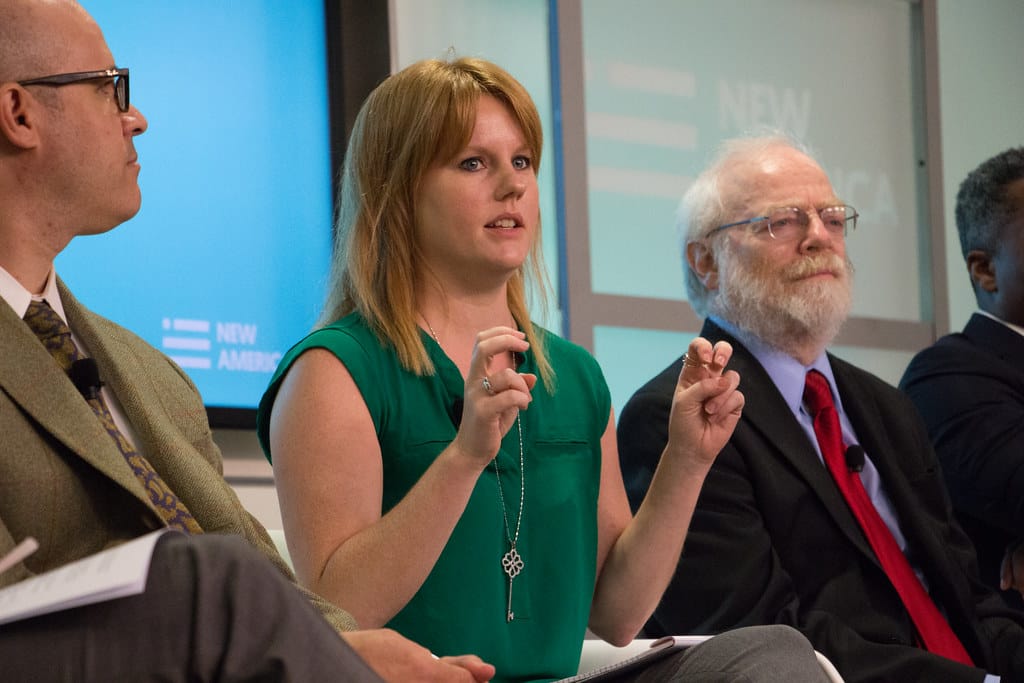Amie Stepanovich at Silicon Flatirons, Amazon Stores Voice Recordings, and Dish Network’s Spectrum Assets
Silicon Flatirons announced Amie Stepanovich as the new executive director of the technology policy think tank based at the University of Colorado Law School. A noted cybersecurity and privacy law and policy expert, she plans to build upon Silicon Flatirons’ legacy of interdisciplinary conferences a

Silicon Flatirons announced Amie Stepanovich as the new executive director of the technology policy think tank based at the University of Colorado Law School. A noted cybersecurity and privacy law and policy expert, she plans to build upon Silicon Flatirons’ legacy of interdisciplinary conferences and programming. She begins on July 29, 2019, succeeding Flatirons’ founder Phil Weiser, who was elected attorney general of Colorado.
Stepanovich previously served as U.S. policy manager and global policy counsel at Access Now, where she was responsible for developing the organization’s U.S. policy and leading global projects at the intersection of human rights and government surveillance.
Prior to this, she was director of the Domestic Surveillance Project at the Electronic Privacy Information Center. Stepanovich is a board member of the Internet Education Foundation and an advisory board member for the Future of Privacy Forum.
Amazon continues to store information about conversations with Alexa on its devices
The Verge reports that Amazon doesn’t always delete the stored data that it obtains through voice interactions with the company’s Alexa and Echo device, even after a user chooses to wipe the audio files from their account. Amazon revealed this in a letter a letter to Sen. Chris Coons, D-Del., dated June 28.
The answers were a follow-up to a request from Coons when he questioned how long the company retains voice recordings and transcripts from Echo interactions. Amazon confirmed some of the allegations. “We retain customers’ voice recordings and transcripts until the customer chooses to delete them,” the letter reads.
There was also a question about whether Amazon held on to text transcripts of voice interactions with Alexa, even after a user has chosen to delete the audio equivalent. In some cases, Amazon chooses to hold on to the data without telling the user.
In its response, Brian Huseman, Amazon’s vice president of public policy, said the company is engaged in an “ongoing effort to ensure those transcripts do not remain in any of Alexa’s other storage systems.” In other words, even if a user manually deletes the audio version, some text versions are still saved in separate storage systems for some unknown amount of time.
“The American people deserve to understand how their personal data is being used by tech companies, and I will continue to work with both consumers and companies to identify how to best protect Americans’ personal information,” said Coons in a statement.
Dish Network’s $20 billion in dormant spectrum could lie fallow longer under T-Mobile/Sprint asset spin off
Bloomberg reports that about $20 billion worth of wireless airwaves, owned by Dish Network Corp, are sitting dormant. If used, they could create more competition and supply millions more high-speed connections.
Dish is on track to get even more airwaves and other assets this year, this time as part of a side deal to T-Mobile US Inc.’s purchase of Sprint Corp. The idea is set up Dish, known for its satellite TV service, as a nationwide wireless carrier, creating a new competitor after the $26.5 billion T-Mobile-Sprint merger subtracts one provider from the U.S. market.
The Federal Communications Commission has been pressuring Dish’s owner Charlie Ergen, to use the spectrum he already has. The FCC has said it will move to take away licenses if Dish doesn’t meet requirements to begin offering mobile service on its existing airwaves holdings by 2020.
T-Mobile and Sprint would let Dish use their infrastructure for six or seven years until Dish can build its own network, people familiar with the matter said this week. That might appeal to the FCC because it would let Dish immediately enter the market, even though it might take more time to use its airwaves.
The agency denied a $3.3 billion discount on airwaves claimed at auction in 2015 by two Dish partners, saying that the firms weren’t independent of Dish. The company’s past misadventures may be on Chairman Ajit Pai’s mind as he weighs whether to entrust Ergen with the fate of the wireless market.
(Photo of Amie Stepanovich, former U.S. Policy Manager and Global Policy Counsel, Access Now, in June 2016 by New America Foundation used with permission.)









Member discussion